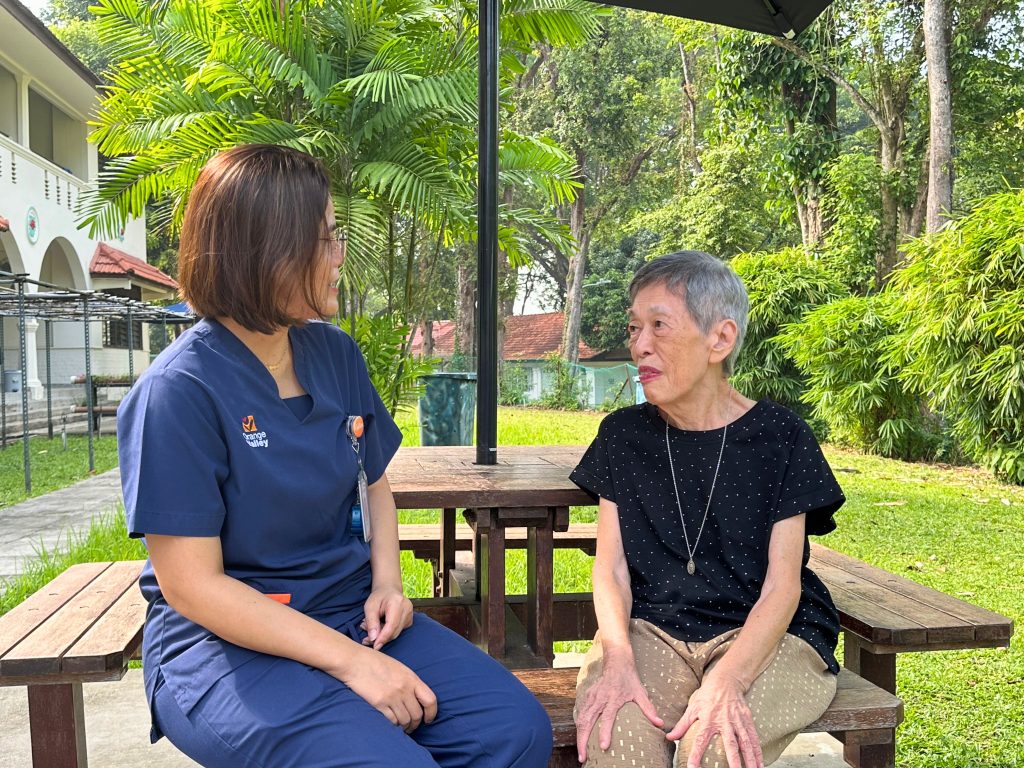Bridging the Gap: Communicating with Loved Ones with Memory Loss
Caring for a loved one who is slowly losing their memory is one of the most emotional and delicate experiences a family can go through. In Singapore, where family ties run deep and filial piety is a core value, watching an elderly parent or grandparent struggle to recognise familiar faces or forget cherished moments can be heartbreaking.
At Orange Valley, we walk this journey every day with families across the island. Through our work in dementia care and elderly support, we’ve learned that communication is not just about words: it’s about connection, comfort, and love.
Whether you’re supporting a parent with Alzheimer’s, a grandparent with dementia, or a loved one showing early signs of memory loss, here are gentle, effective ways to keep the lines of communication open.
Understanding What Your Loved One is Going Through
Memory loss isn’t just about forgetting names or places, it changes how a person experiences the world. Your loved one might repeat questions, lose their train of thought, or mix up the past and present. These behaviours can be confusing, even painful, for families.
But try to remember that they are not doing it on purpose. The person you love is still there, just navigating the world differently now.
In Singapore, where many of us live in multigenerational homes or care for ageing relatives, learning how to communicate with empathy and patience can make all the difference.
1. Speak Simply, with Love

Use short sentences, speak slowly, and be clear but never condescending. A gentle tone often says more than words.
Instead of: “What do you want to eat?”
Try: “Would you like nasi lemak or porridge today?”
Give your loved one time to respond. Silence isn’t confusion but they might just be processing.
💬 Caregiver Insight: Sometimes, they may forget what was just said, but they’ll remember how your words made them feel.
2. Create a Safe and Familiar Space

Seniors with memory loss may feel overwhelmed by noise or new surroundings. Speak in quiet places maybe during a walk downstairs, or while sitting at home after lunch.
Keep routines familiar. Familiarity brings comfort: like knowing kopi is always served at 3pm, or that you’ll call every evening.
🌿 Local Tip: Use sights, smells, or music from their past like old Mandarin songs, Malay lullabies, or Hokkien phrases to create a sense of home.
3. Listen with Your Heart, Not Just Your Ears

Your loved one might say something that isn’t true like mentioning someone who has passed away or confusing people. It can be tempting to correct them, but sometimes, the kindest response is to simply go along and listen.
Instead of: “That person is gone already.”
Try: “Yes, she meant a lot to you. What do you remember most about her?”
The goal isn’t to bring them back to our reality, but to step into theirs with kindness.
4. Use Visuals and Touch as Bridges

A warm hand on theirs. A family photo from the past. A favourite scarf, or the smell of pandan cake.
When words fail, these small gestures can open doors to memories, comfort, and connection. Create a memory book with labelled photos or bring back familiar items from their past.
For example, label family photos in both English and their preferred language (Mandarin, Malay, Tamil, or dialect). It’s a beautiful way to reminisce and reconnect.
5. Speak Their Language

Many elderly in Singapore express themselves best in their mother tongue or dialect. If your loved one used to speak Cantonese or Teochew, even using just a few familiar phrases can mean the world.
You don’t have to be fluent. What matters is the intention.
🧡 “吃饱了吗?” or “Jiak ba buay?” is more than small talk, it’s love wrapped in habit.
6. Support Your Helpers and Family Circle

In many Singapore homes, foreign domestic helpers play a big role in caregiving. Ensure they understand how to respond with calmness and empathy when dealing with loved ones with memory loss.
Teach them:
ü Not to argue or correct but instead go along and listen
ü How to soothe during confusion or distress
ü Who to contact in an emergency
Family caregiving can also be exhausting. Let them know to not be afraid to ask for help or take a break. They deserve support too.
7. Don’t Walk This Journey Alone. Seek Support
There are many dementia care resources in Singapore that can lighten your load:
- Agency for Integrated Care (AIC): Dementia Support 1800 650 6060
- Dementia Singapore: Singapore’s leading Social Service Agency in specialised dementia care
- Orange Valley: Memory care services, respite care, and dementia-friendly nursing homes
Whether you’re looking for day care, short-term support, or full-time dementia care, help is available, and you don’t have to carry this burden alone.
Orange Valley’s Commitment to Dementia Care
At Orange Valley, we believe in care that goes beyond routine. Our dementia care teams are trained to connect deeply with each resident using compassion, respect, and understanding. From structured routines to sensory therapy, we focus on what matters most: helping our seniors feel safe, loved, and heard.
Memory loss may change how your loved one remembers but it doesn’t erase the love you share. Even when they forget names, they still remember feelings. A soft voice. A shared laugh. A gentle hug.
If you’re caring for someone with dementia, know this: You are not alone. And every moment of kindness you offer matters more than you know.
Need help navigating dementia care in Singapore?
Contact Orange Valley today to learn how we can support you and your loved one.
